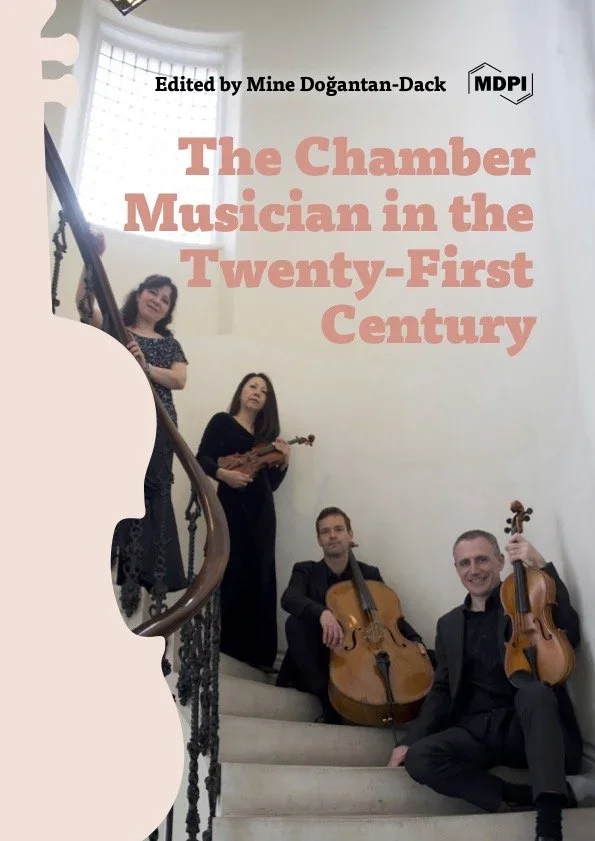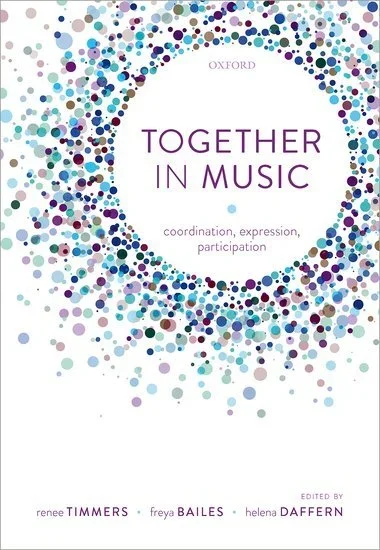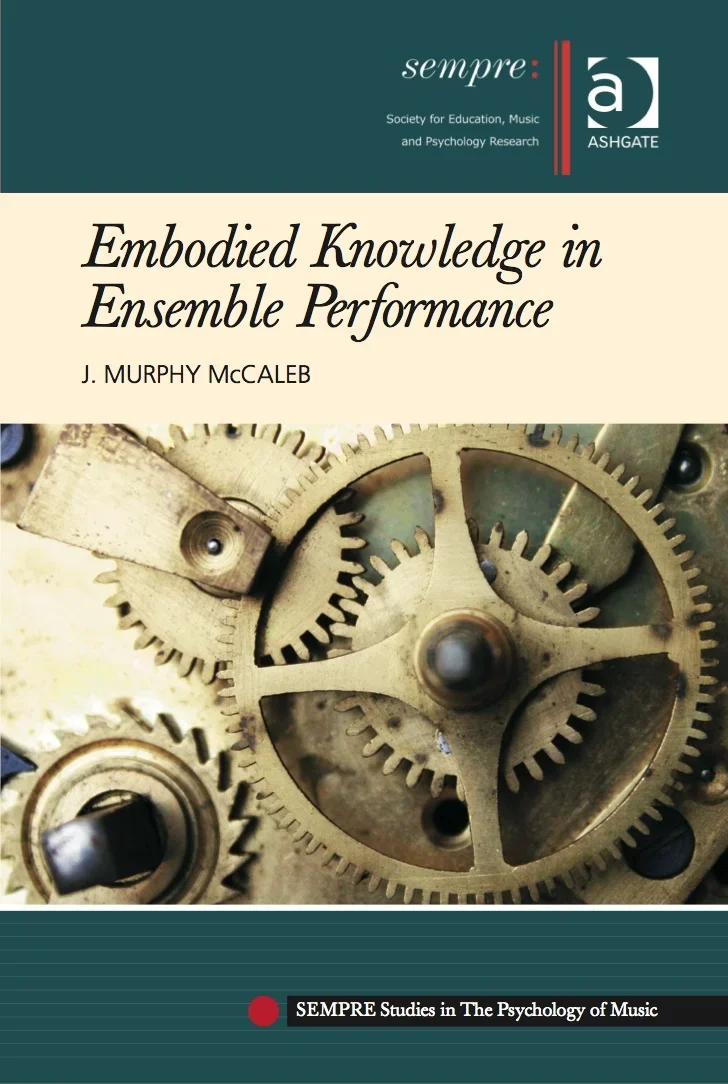My research explores inclusivity in musical performance: most notably, how ensemble performance may be taught in ways that empower students, how chamber music may adapt within modern society to return to its participatory roots, and how improvisation may be structured to invite performers to express their creative autonomy.
This page provides an overview of my written research outputs with a full list of conference presentations at the bottom. Should you like copies of any unpublished work, please contact me.
Composing Improvisational Cells for Networked Music Performance (journal article)
This paper explores artistic and technical strategies for musicians to play in a cohesive ensemble while physically remote from each other. Applying to digitally networked musicking as well as events where musicians are distributed around the performance area, the result of this research is expressed through composition and performance. This research also highlights how lived experience and context may inform musical practice in unexpected yet interconnected ways. As the Covid-19 pandemic began, author David Kessler wrote that ‘we’re feeling a number of different griefs. … We are not used to this kind of collective grief in the air’ (2020). Augmenting this shared grief was my personal grieving for the death of my parents two years prior. This global and personal context provided an opportunity to not only cathartically create art but also research existing parameters of ensemble musicking. Research on networked music performance attracted broader attention as musicians struggled to play together online and prompted me to explore these methods as a means of co-constructing learning with my university students. Through this experience I composed The Hour of Lead, a large-scale work for mixed ensemble. Rather than attempting to minimise or ignore latency, this piece explores compositional strategies that embrace latency as an aesthetic and logistical feature. Musicians perform from video notation in parallel with each other allowing for structural and harmonic progression. Ambiguities in the video notation, however, encourage a high level of performer autonomy. In this way, large-scale synchronisation is maintained whilst small-scale synchronisation is rendered irrelevant. Thus, this artistic research responds to technical and creative issues around networked music performance in a way that explores different lived experiences of grief.
Chambering Music (book chapter)
Chamber music occupies a complicated position within twenty-first century society. Born out of a tradition of participatory domestic music making, the term now simultaneously refers to both an activity and a repertoire. However, there is little evidence that either of these maintain a similar cultural locus to chamber music’s origins. The modern activity of chamber music has been primarily professionalised and elite, with its repertoire part of the established canon of Western Art Music. Within musicological writing, chamber music is regularly noted as being emblematic of an equal society and characterised by its intimacy. Paradoxically, this equality and intimacy is within a performative framework that is exclusionary: although chamber music is still hailed as an intimate art form, there are limits to its inclusivity. Whilst it may have been more accessible at its origins, it does not fulfil the same societal niche now. This chapter attempts to more objectively evaluate chamber music as a form of interpersonal musicking within the twenty-first century, prompting an exploration of how chamber music may be redefined to escape potential anachronism.
Teaching Through Ensemble Performance (book chapter)
Teaching ensemble performance in higher education tends to draw on staff members as conductors or mentors, approaches which can easily remain unexamined. This research investigates a third potential path, participatory ensemble teaching, where I step away from the podium and play less (obviously) important musical parts. Using alternating leadership in this way was designed to help students engage more critically than otherwise, allowing them to ‘learn musical independence as they might learn civic participation, by making musical decisions that matter’ (Shieh and Allsup, 2016: 33). Through rehearsal observations and focus groups, I assess the effectiveness of this approach to small ensemble teaching across all three years of an undergraduate music programme. In addition to reflecting on the impact of participatory ensemble teaching, this case study explores issues around equality, power relationships, and the role of the lecturer within ensembles.
Embodied Knowledge in Ensemble Performance (monograph)
Performing in musical ensembles provides a remarkable opportunity for interaction between people. When playing a piece of music together, musicians contribute to the creation of an artistic work that is shaped through their individual performances. This book explores the processes by which musicians interact with each other through performance. McCaleb begins by breaking down current models of ensemble interaction, particularly those that rely on the same kind of communication found in conversation. In order to find a new way of describing this interaction, McCaleb considers the nature of the information being shared between musicians during performance. Using examples from postgraduate ensembles at Royal Birmingham Conservatoire as well as his own reflective practice, he examines how an understanding of the relationship between musicians and their instruments may affect the way performers infer information within an ensemble. Drawing upon research from musicology, occupational psychology, and philosophy, and including a DVD of excerpts from rehearsals and performances, Embodied Knowledge provides an holistic approach to ensemble research in a manner accessible to performers, researchers and teachers.
Praise for Embodied Knowledge in Ensemble Performance
"The substantial and excellent review of literature is distributed throughout the comprising six chapters, providing a natural connection between case studies, previous research, and resultant conclusions. While the author suggests the book has value for both researchers and practitioners, the most prominent result of the discourse provides a new paradigm with which to study ensemble interaction […]. Embodied Knowledge in Ensemble Performance is clearly and logically written and draws upon an impressively broad range of research and literature to form the premise for the author’s proposed paradigm of ensemble interaction. McCaleb strongly establishes his contention that ensemble performance is distinct from other social paradigms due to music being a singular form of procedural knowledge. His discussion of the use of metaphor and musician-instrument physicality is also a welcome contribution." Eric C Melley, Philosophy of Music Education Review
"McCaleb’s book is a timely and valuable contribution to this ever-expanding field, drawing together many of these areas of study and re-examining the assumptions made in approaches to existing research to construct a new framework for examining co-performer interaction. […] This book on embodied knowledge in ensemble performance is a welcome addition to a key area of musicology research and offers some new and valuable insights into co-performer interaction and musical development. McCaleb successfully fulfills his aim of offering an improved, more specific framework, treating co-performer interaction in its own context rather than viewing it from a broader sociological stance, as in previous research. […] Future work in the field will benefit from this framework and the new directions set forth here. With a clear structure, careful introduction to its various concepts, and great depth of inquiry, this is an essential text for scholars of all levels with an interest in ensemble performance." Caroline Waddington, Musicæ Scientiæ
"McCaleb identifies critical elements that constitute the phenomenology of playing any musical instrument, develops a new understanding about the information content, and demonstrates how such information content is communicated in performance ensembles. He is at his best in these chapters, skilfully drawing on concepts from psychology, sociology, neurology and philosophy, as well as music theory. […] McCaleb excels in drawing appropriate examples from real situations. It is his ability to refer to real situations of ensemble performance with sensibility, even when the argument is most abstract and remote from music, that makes this book most engaging. […] The book is exemplary in its scholarship and an invaluable addition to the literature on musical performance." Mieko Kanno, Scottish Journal of Performance
Conference Presentations
‘Cultivating inclusive ensemble environments in higher music education’ delivered at the Cultural Diversity in Music Education 17th International Conference, Mary Immaculate College and the Irish World Academy of Music and Dance (Limerick, Ireland), 30 September–2 October 2025.
‘Student Identity at the Heart of Ensemble Pedagogy’ delivered at the Broadening Musical Performance Conference, University of Surrey (Guildford, UK), 26–27 June 2025.
‘Ensemble Musicking and Cultural Inclusivity’ delivered at MusicHE and DramaHE Essential Not Optional Conference, University of Lincoln (UK), 26–27 June 2024.
‘Musical Ensembles and Inclusivity’ delivered at the Talk About Teaching Conference, York St John University (UK), 17 June 2024.
‘Ethos, Technique, and Performance: Rethinking Ensembles in Higher Education’ delivered at the Performance Studies Network Fifth International Conference, Norwegian Academy of Music (Oslo, Norway), 5–8 July 2018.
‘Teaching Through Ensemble Performance’ delivered at the conference Together in Music: Expression, Performance and Communication in Ensembles (York, UK), 12–14 April 2018.
‘Playing Together: developing ensembles through musical play’ poster delivered at the International Society for Music Education 32nd World Conference (Glasgow, UK), 24–29 July 2016.
‘Playing Together: developing ensembles through musical play’ delivered at the Performance Studies Network Fourth International Conference, Bath Spa University (UK), 14–17 July 2016.
‘Heart of Tones and the Dilation of Time’ delivered at the Royal Musical Association Study Day ‘Keeping Time? New Approaches to Temporality’, University of York (UK), 13 June 2016.
‘Thinking in Performance’ delivered at the Tacit or Loud Symposium and Festival for Artistic Research (Malmö, Sweden), 28 November–3 December 2014.
‘Developing Ensemble Musicians’ delivered at the seventh international Orpheus Research Centre in Music (ORCiM) seminar ‘From Output to Impact: The integration of artistic research results into musical training’, Orpheus Institute (Ghent, Belgium), 19–20 November 2014.
‘Inter-reaction as creative process in improvisation’ delivered at the Performance Studies Network Third International Conference, University of Cambridge (UK), 17–20 July 2014.
‘Embodied Knowledge in Popular Music Ensembles’ delivered at the International Festival for Artistic Innovation, Leeds College of Music (UK), 10–14 March 2014.
‘Embodied Knowledge: The Case of Ensemble Performance’ delivered at the Performance Studies Network Second International Conference, University of Cambridge (UK), 4–7 April 2013.
‘Intention and Action in Musical Performance’ delivered at the Royal Musical Association Study Day: Challenging Musical Ontologies, University of Nottingham (UK), 23 November 2012.
‘Research Through Music: Reflecting on Practice-as-Research Within a Conservatoire Doctoral Programme’ delivered at the Association Européenne des Conservatoires sponsored European Platform for Artistic Research in Music, Conservatorio di Santa Cecilia (Rome, Italy), 10–12 May 2012.
‘Making Sense: Sensory input’s effect on live electronic music performers’ delivered with Tychonas Michailidis at the Conference on Interdisciplinary Musicology (CIM11), Glasgow Caledonian University (UK), 30 August–3 September 2011.
‘Communication or Interaction? Applied environmental knowledge in ensemble performance’ delivered at the Performance Studies Network First International Conference, University of Cambridge (UK), 14–17 July 2011.
‘Embodied knowledge in ensemble performance: the case of informed observation’ delivered at Performa’11 Conference on Performance Studies, University of Aveiro (Portugal), 19–21 May 2011.
‘Gesturing (in) Music: Preliminary Findings’ delivered at the Royal Musical Association Postgraduate Students’ Conference, University of Manchester (UK), 13–15 January 2011.
‘Through the Looking Glass: Using action research within an observational methodology’ delivered at the Royal Musical Association Study Day: Collaborations in Practice Led Research, University of Leeds (UK), 23 October 2010.
‘Things Get Broken: Canon as a sign of division in Bernstein’s dramatic works’ delivered at the Royal Musical Association Students’ Conference, University of York (UK), 7–9 January 2010.



